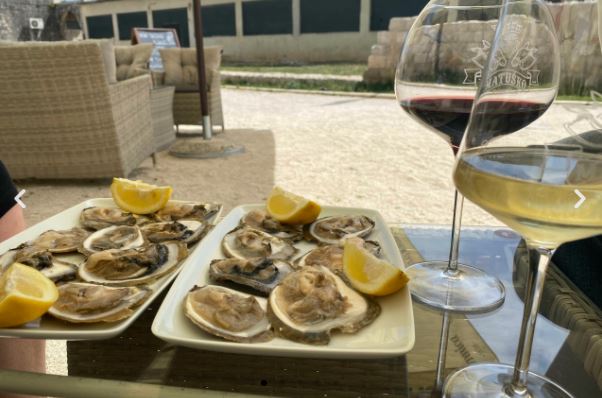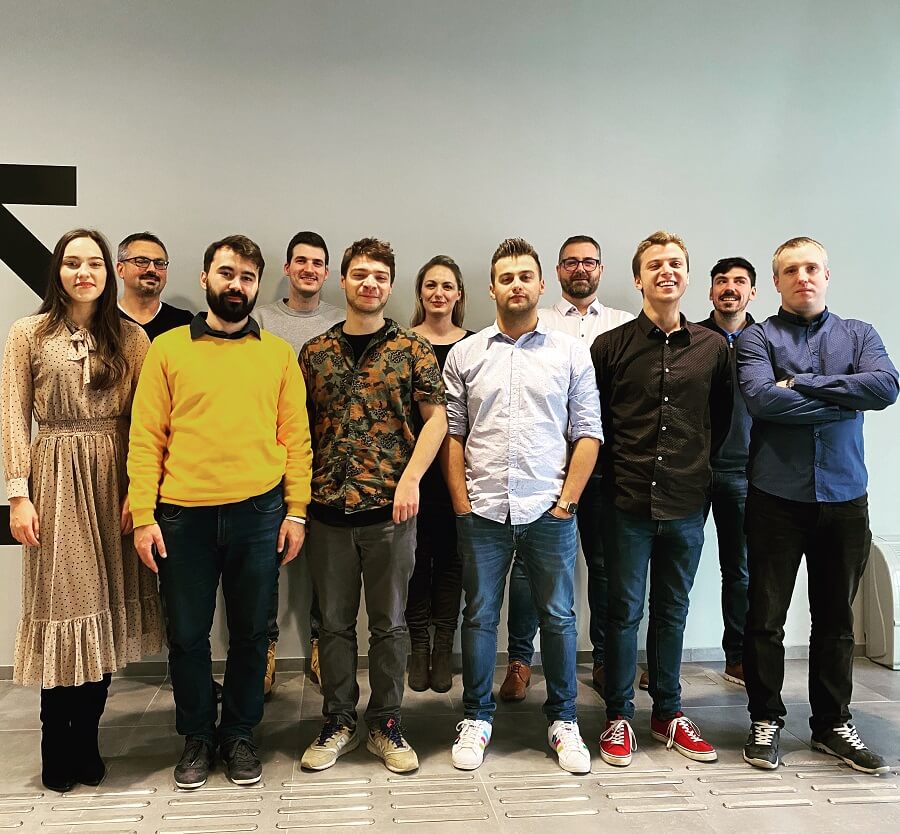Authentic Croatia: Making Soparnik in the Poljica Republic, Omis (VIDEO)
April 17, 2023 - High in the hills above gorgeous Omis is a truly unique place, where culturally protected food is prepared in an independent republic - making soparnik is the Poljica Republic.
One of the secrets of tourism in Croatia is the simplicity of its cuisine, the freshness of its products, and the unlimited unique and authentic experiences. It is wonderful to watch how some enterprising locals are taking the simple pleasures in life which cost almost nothing, then package them up as an authentic experience which completely wows their visitors.
The case of soparnik, a delicious dish now under EU cultural protection, is a case in point. Regarded as peasant food for as long as anyone can remember, the ingredients are very, very basic, and yet today it has become one of the must-try culinary experiences on a visit to Dalmatia and especially the area about Omis, which is the soparnik heartland. And not only a culinary tourism experience, but some enterprising locals have turned this into a full-blown excursion and cooking experience in the rather fabulous Poljica Republic, a bastion of independence from the 12th century all what way until the arrival of Napoleon 700 years.
The Poljica Republic was a network of 12 towns from the Cetina River further inland, which had its own statute and regulations, and which was very advance in its governance, effectively resisting Ottoman invasion for over 400 years. Its flexible statute changed with the times, and it was written by the people, for the people. Its core values included the freedom of all residents to fend for themselves, zero tax, and the election of the Duke of Poljica each year.
The republic may be no more, but its legacy lives on, and a guided tour of the excellent museum, combined by a cooking lesson in making soparnik is a superb way to experience the tradition and cuisine of this rather unique slice of inland Dalmatia. Check out the CROMADS experience video below.
And the ingredients which go into making soparnik? Nothing too complicated or expensive - 500 g all-purpose flour (3 1/2 cups), 1/2 tsp. salt, 4 Tbls. olive oil, 50 ml water (1 1/4 cup), 1 bunch parsley leaves, 1 kg chard (2.2 lbs), 1 bunch spring onions, salt, 3-4 garlic cloves, olive oil, and Fresh parsley leaves.
****
You can subscribe to the Paul Bradbury Croatia Expert YouTube channel here.
What is it like to live in Croatia? An expat for 20 years, you can follow my series, 20 Ways Croatia Changed Me in 20 Years, starting at the beginning - Business and Dalmatia.
Follow Paul Bradbury on LinkedIn.
Croatia, a Survival Kit for Foreigners is now available on Amazon in paperback and on Kindle.

CROMADS in April: Visit Croatia's $6bn Airbase, 18th Century Grain Ship Cruise
April 1, 2022 - Looking to explore the real Croatia on the road less travelled? The Zagreb CROMADS Travel Club takes you back to the 18th century on the Kupa River and inside an incredible US$6 BILLION secret airbase.
After almost 20 years in Croatia, and just when I thought I knew most of its many impressive secrets, I realised that I knew very little at all.
Our new CROMADS platform, showcasing authentic Croatia, 365 days a year all over the country, has been a huge voyage of discovery into the road less travelled in this beautiful land.
Ever since the first event for the CROMADS Travel Club (you can sign up here), the quite incredible GINcredible gin education and tasting, the concept of a travel club offering unique and authentic experiences that are hard to find elsewhere has got me very excited. And if you are in Zagreb, that fun is set to continue next week, with two great tours showcasing parts of Croatian history that few know about.
Did you know, for example, that Croatia has a secret airbase with 5 runways built into a mountain, whose construction costs were estimated at US$6 BILLION? One of the most far-out things I have seen on Planet Earth.
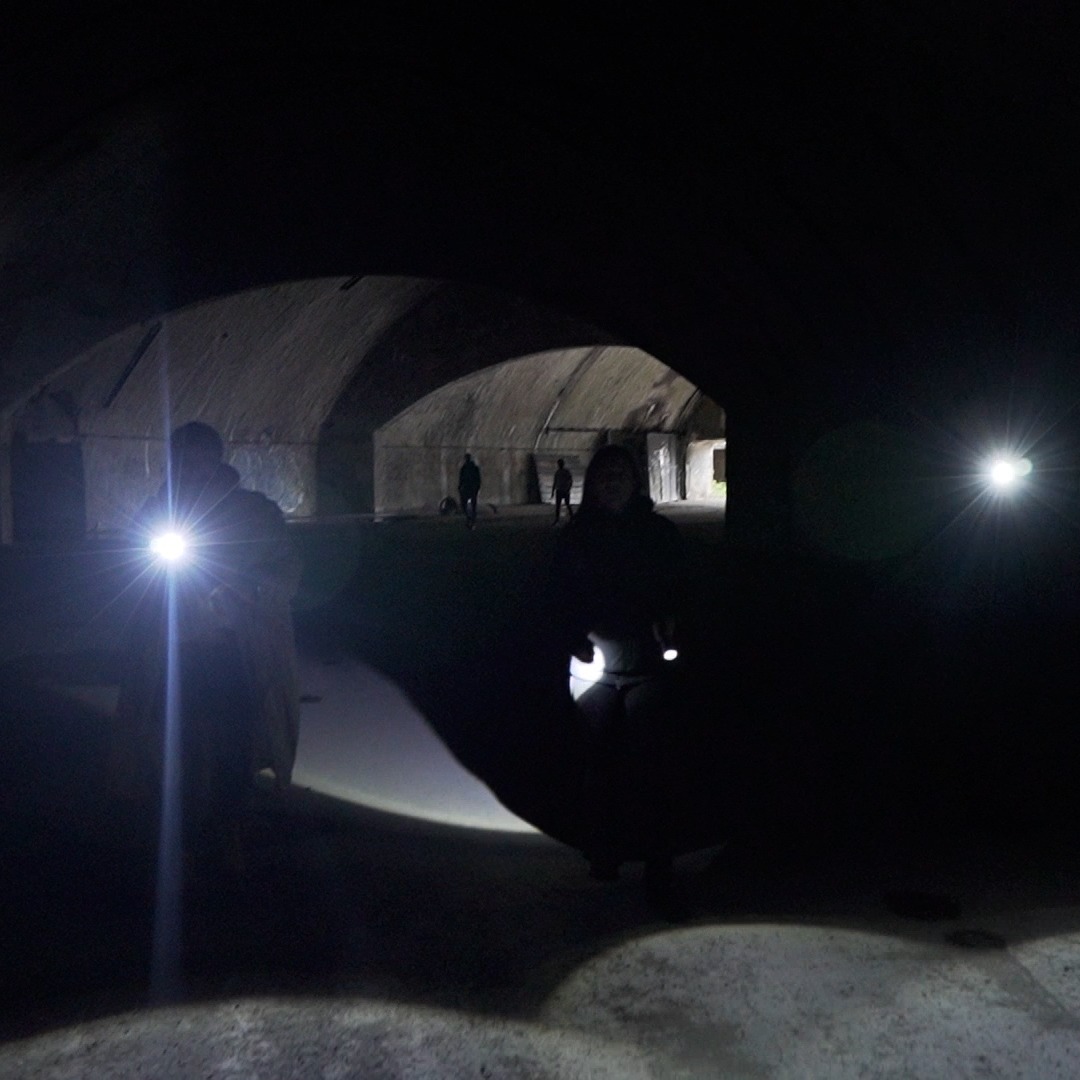
But we start on Tuesday, April 5, with something a little more tranquil and historic - a wonderful day in nature aboard a replica grain ship on the River Kupa. A journey back in time, surrounded by idyllic nature, experiencing aspects of Croatia as it really once was. You can learn more here or check out the tour highlights below.

⚓ AURORA BOAT EXPERIENCE
5th of April (Tuesday)
⏰ 15.30h -19.00h
Meet in front of Ethnographic Museum Zagreb
*Welcome On Board Žitna lađa - Karlovac *
Let us take you out of the city and on a unique European tour down the Kupa river onboard “Zora” – a replica of the 18th-century grain boat.
PRICE: 40,00€/per person
✅Private 2- way transfer
✅Private tour guide
✅Private 90min boat ride on Kupa river
✅Finger food, homemade cakes, liquor tasting and two glasses of local wine
Limited spots so book yours at
This email address is being protected from spambots. You need JavaScript enabled to view it.
And for something really far out, the following day has us heading to the Croatian border with Bosnia to visit surely Tito's most unbelievable project - a huge military airbase built inside a mountain, located mostly in Croatia but also in BiH, capable of housing up to 80 MiG fighters. An airbase that was fully operational until 30 years ago. Learn more about the spectacular Zeljava Airbase. While Zeljava is the highlight, there is plenty more included in this fascinating day, including Tito's view of Plitvice Lakes from his former villa. Check out the itinerary below, and contact CROMADS partners, Swanky Travel, to book.
A UNIQUE day tour to places you did not know exist.
Turbulent Croatian history has left a huge heritage behind including some amazing places that are abandoned.
1. The biggest and best kept secret project of ex-Yugoslavia stands today as a reminder of some different times - Zeljava underground airbase.
2. Another amazing location is Villa Izvor - one of the residences of former Yugo president Tito situated just above the source of Plitvice lakes.
URBEX TOUR
6th of April (Tuesday)
⏰ 8.00h - 20.00h
Meet at Swanky Mint
PRICE: 75,00€/per person
*private small group tour
✅Private 2- way transfer
✅Private tour guide (urbex expert)
✅Željava underground airbase visit
✅ Abandoned Villa Izvor visit
✅ Flashlights for underground exploration
✅ Tickets for Museum of Homeland war
After the Ston Oyster Festival and a 3-tour day in Imotski, the CROMADS Split Travel Club will be back shortly with more authentic experiences in a couple of weeks. Stay tunes, or better still, join the CROMADS Travel Club and be the first to hear about the news. Or follow CROMADS on Facebook.
Croatia Through the Eyes of a Digital Nomad: A Feast and a Festival with Oysters & Wine
March 25, 2022 - The Feast of St. Joseph meets the Festival of Oysters on Pelješac for a fun day of food, wine, and Dalmatian music.
Two years ago this month I arrived in Split, with a mission to visit to the Ston oyster festival and the town’s famous walls on top of my list. Foodies know the tradition that you should only eat wild oysters during the months that contain the letter "r" in the name – from September to April – and this time of year is peak season for fresh oysters. Even the ancient Romans who inhabited these parts followed this opinion to get their favorite aphrodisiac.
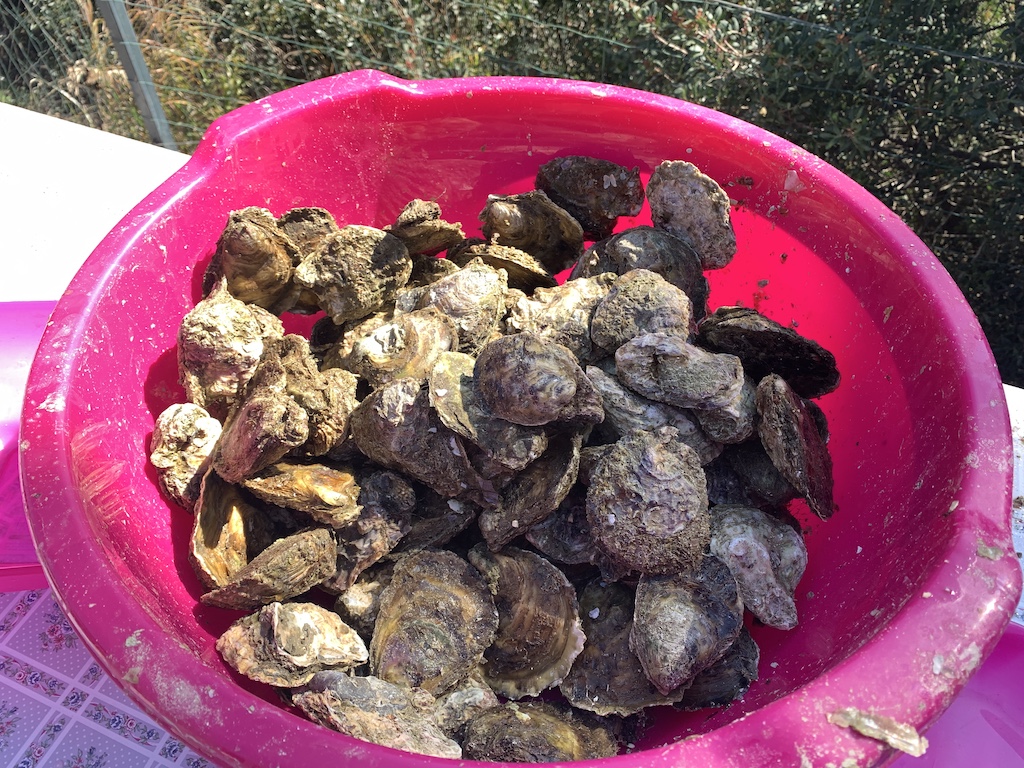 The local oysters found in Mali Ston are called European Oysters, or Ostrea Edulis.
The local oysters found in Mali Ston are called European Oysters, or Ostrea Edulis.
The festival returns
But alas, covid-19 cancelled the festival two years ago and my plans have been on hold, until now. A trip to Bistrina for the annual oyster festival in Mali Ston was a chance to both taste the shellfish this area is famous for and wash it down with vino that puts the Pelješac peninsula on any wine-lover’s radar. The funny thing is, I grew up on the Atlantic Ocean and I adore all seafood, except oysters. I was willing to give them a try in Croatia based on the reputation, but I was hoping there would be more.
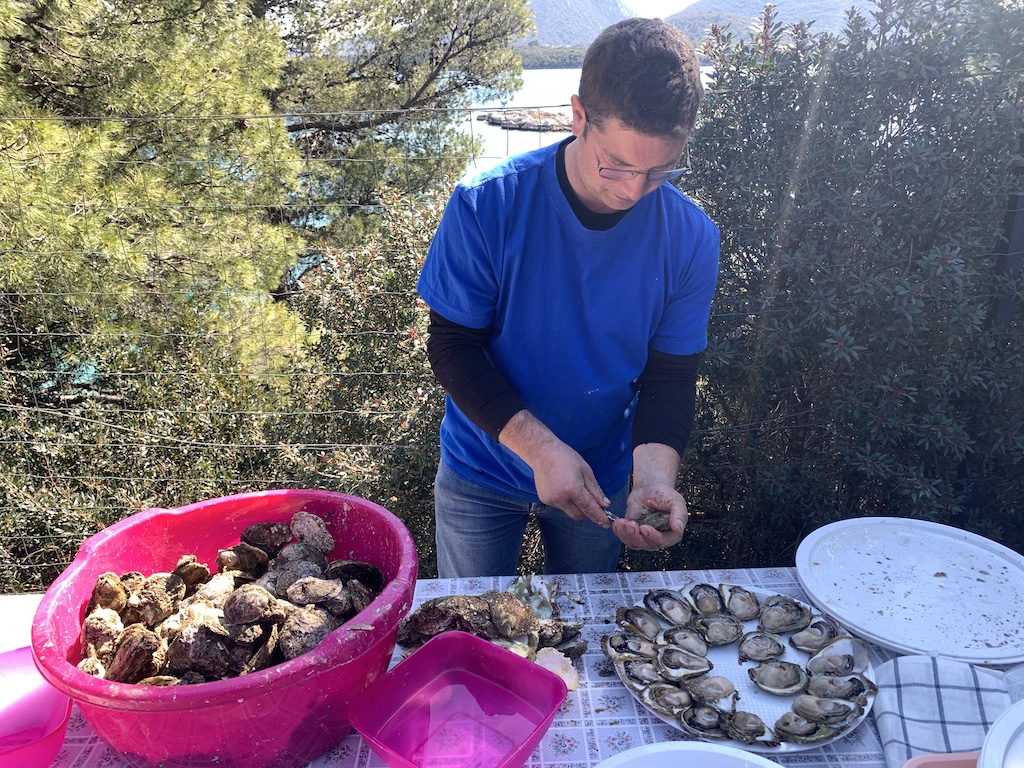 Farming and harvesting oysters in Mali Ston dates back to the Roman days of the Republic of Ragusa (1358-1808) and was a source of wealth that exceeded salt.
Farming and harvesting oysters in Mali Ston dates back to the Roman days of the Republic of Ragusa (1358-1808) and was a source of wealth that exceeded salt.
I joked with a friend that my favorite part of the festival was carrying my wine glass around on my neck, which was a first for me. It looked ridiculous but it was convenient for hands-free slurping of oysters and also more wine, lol. When it came to tasting, the best food tip I received all day was to simply squeeze lemon on the oysters and then suck them off the shell. I can’t say I tasted anything, except for the lemon juice, but it was fun.
Father’s Day
Not accidentally, the festival coincides with the Feast of St. Joseph every March 19, also called Saint Joseph’s Day. It has to do with the Feast falling during lent and abstinence from meat. This is Father’s Day in Croatia and named after Jesus’s dad. Christian heritage here believes he’s the patron saint of Croatian people and a protector of families and carpenters/workers.
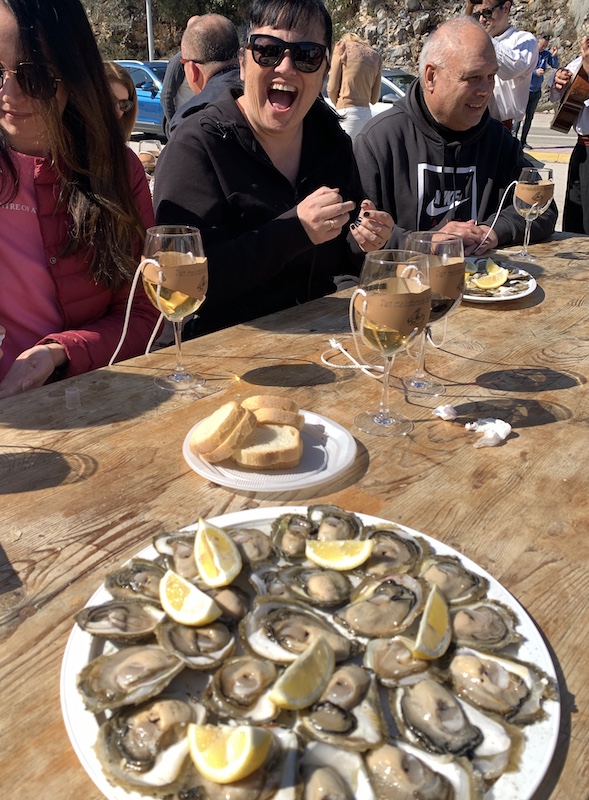 Chowing down with fellow Cromads.
Chowing down with fellow Cromads.
Cultivation techniques
Walking around Bistrina, I noticed clusters of plastic markers throughout the bay. Farmers use a system with cages and a technique of suspending oysters in the water to help them grow. To indicate how seriously people take this business, a nearby mariculture laboratory—part of the University of Dubrovnik—conducts research, testing, and quality checks on the oysters and the mussels from these beds.
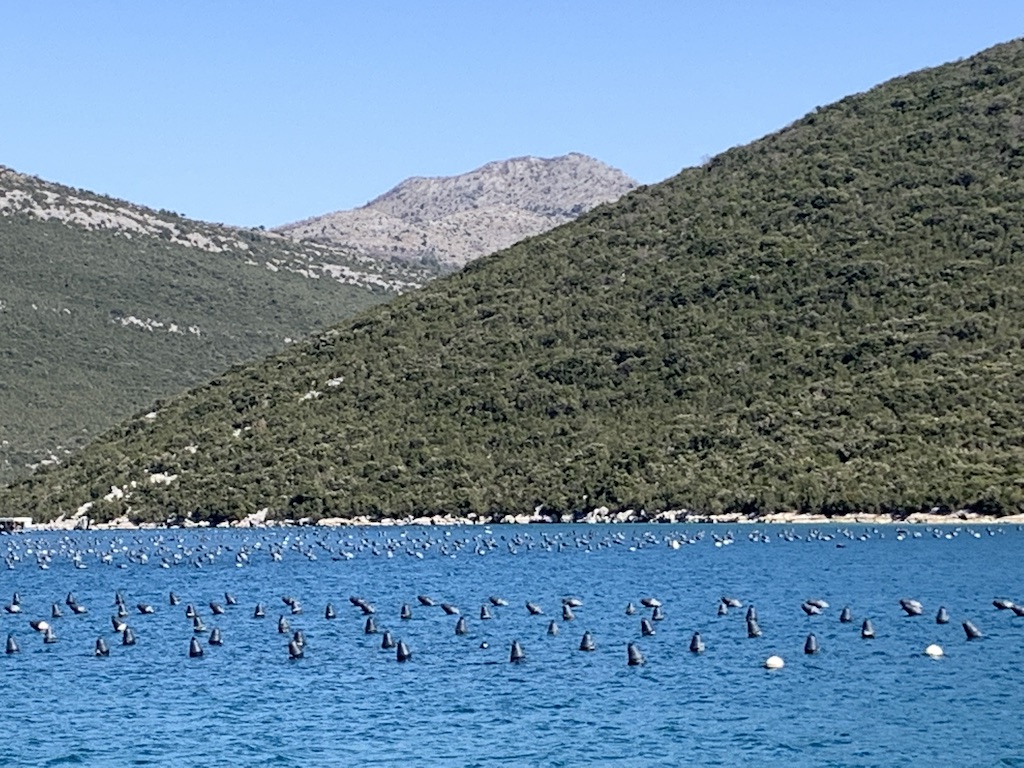 Plastic markers in the bay indicate where the oyster beds are. Minerals and phytoplankton in the salty water contribute to the high-quality of the shellfish.
Plastic markers in the bay indicate where the oyster beds are. Minerals and phytoplankton in the salty water contribute to the high-quality of the shellfish.
Cultivation dates back to the 14th century and peaked in the 1980s with 3,000 tons of mussels and two million oysters produced annually.
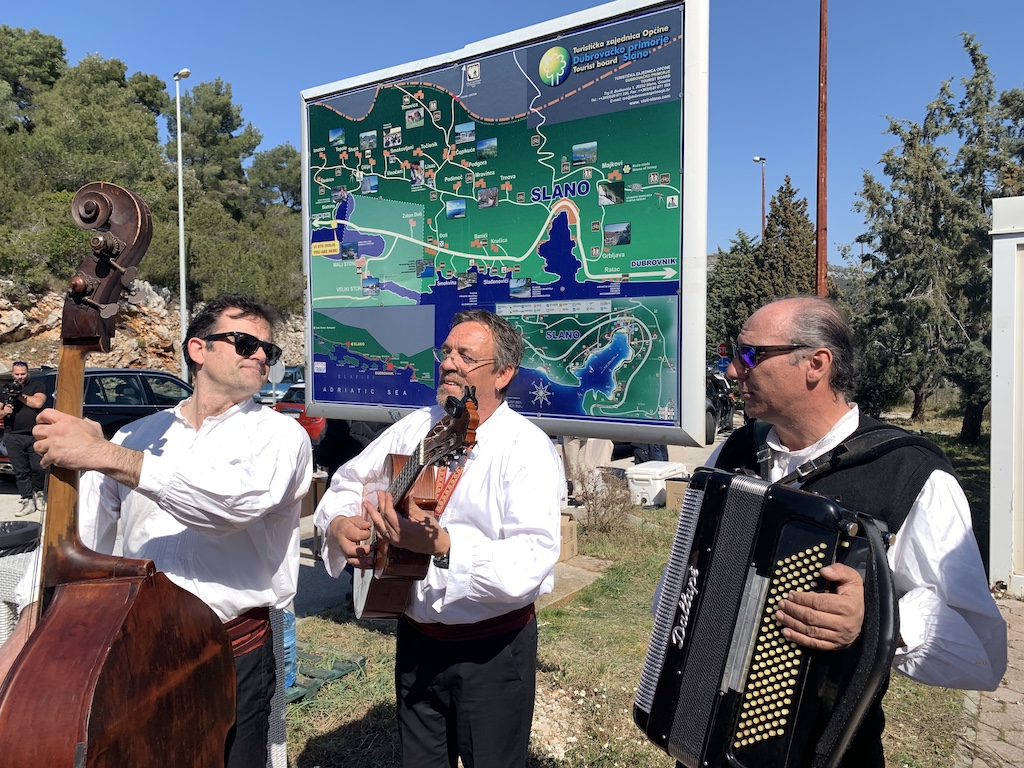 Local musicians play favorite Dalmatian tunes.
Local musicians play favorite Dalmatian tunes.
Natural sea salt, high-quality freshwater, and favorable environmental conditions are the secret sauce for producing exceptional shellfish in this area, and the corresponding wealth. Rumor has it that Roman aristocrats from the days of the Ragusan Republic were even paid in oysters instead of money. So, would they eat their money??
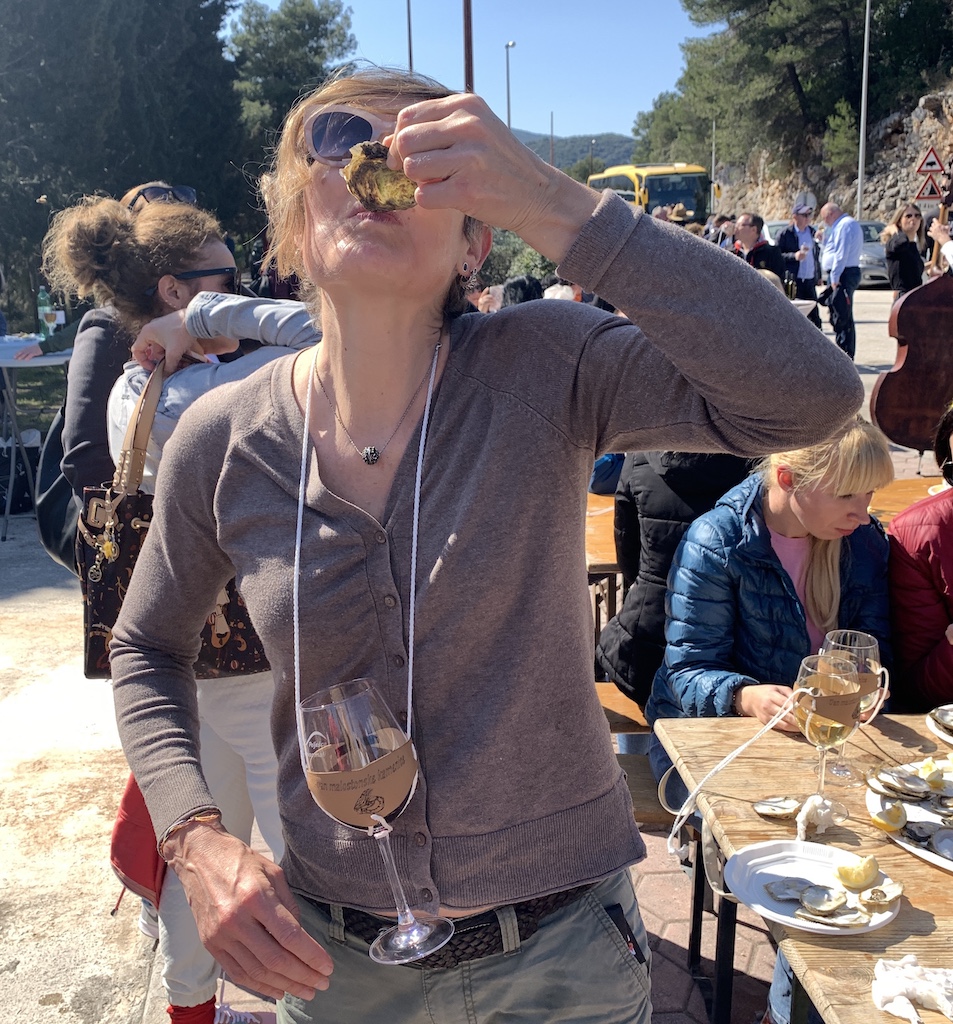 The author keeps her wine glass close to sip and slurp.
The author keeps her wine glass close to sip and slurp.
Ston saltworks
A different system exists over at Ston with an equally impressive history: the saltworks. Salt pans look like a grid dividing the surface of the water. Traditional production methods to extract salt using the sun and wind have remained the same for centuries and everything is still done by hand. Again, healthy environmental conditions are perfect for creating a superior product.
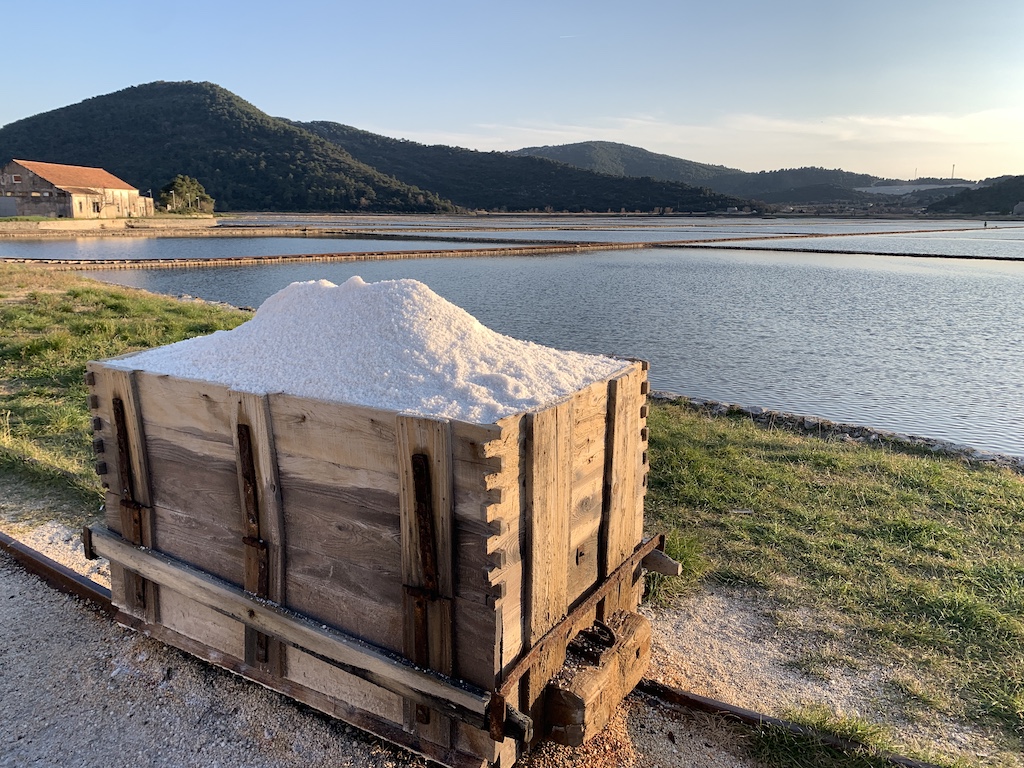 Salt has been a source of wealth in Ston for centuries, also since the Republic of Ragusa ran things here. These saltworks are the largest in Europe.
Salt has been a source of wealth in Ston for centuries, also since the Republic of Ragusa ran things here. These saltworks are the largest in Europe.
As with the shellfish, Ston’s “white gold” dates back to the Middle Ages as a white-hot commodity. In fact, salt sparked wars and influenced trade routes. Wowza!
Rich history
The day turned out to be much more than hitting up a festival. Ston and Mali Ston have a rich history of tradition, labor, and economics in shellfish and salt, and there’s the famous Pelješac wine. The walls of Ston are another highlight as one of the largest preserved fortification systems in the world, but that’s another story. And let’s not forget the Feast and Father’s Day.
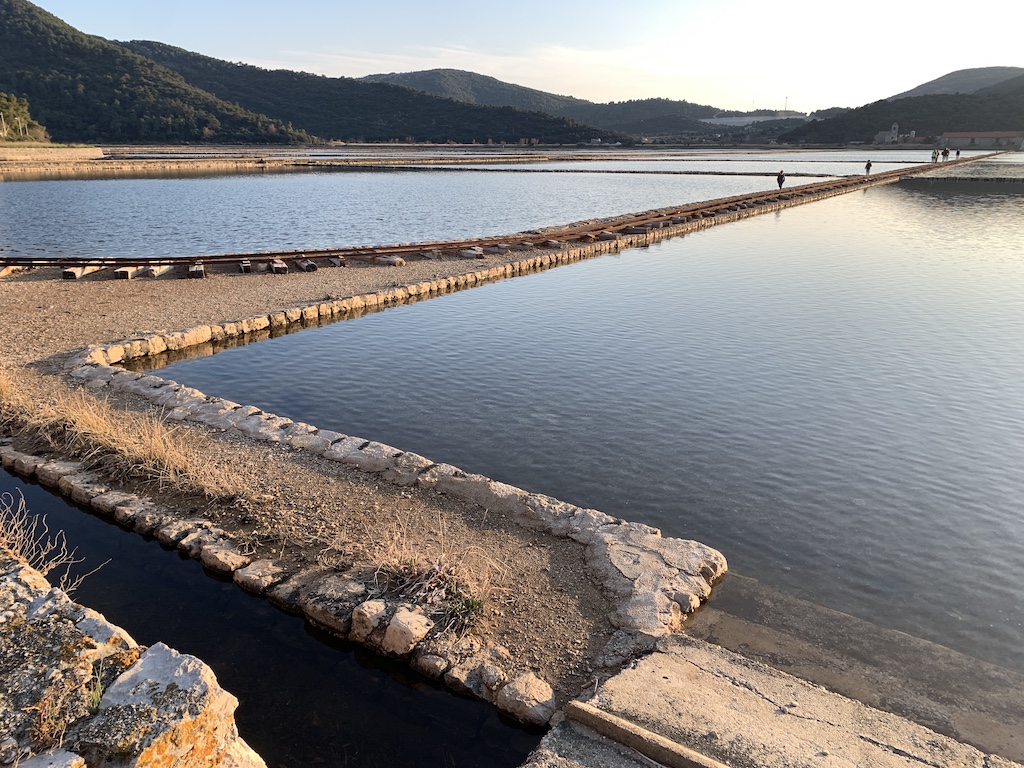 Gates are opened to let water flood into the salt pans. When the water evaporates, the salt is left behind. This process is repeated over and over and the salt is harvested once a year.
Gates are opened to let water flood into the salt pans. When the water evaporates, the salt is left behind. This process is repeated over and over and the salt is harvested once a year.
I love piecing together the cultural connections in this region. It’s one of the reasons I love to travel, for authentic experiences and learning about places that are so different from my home. As a bonus, I got to spend the day with adventurous new friends and digital nomads. The trip was organized by the Cromads travel club.
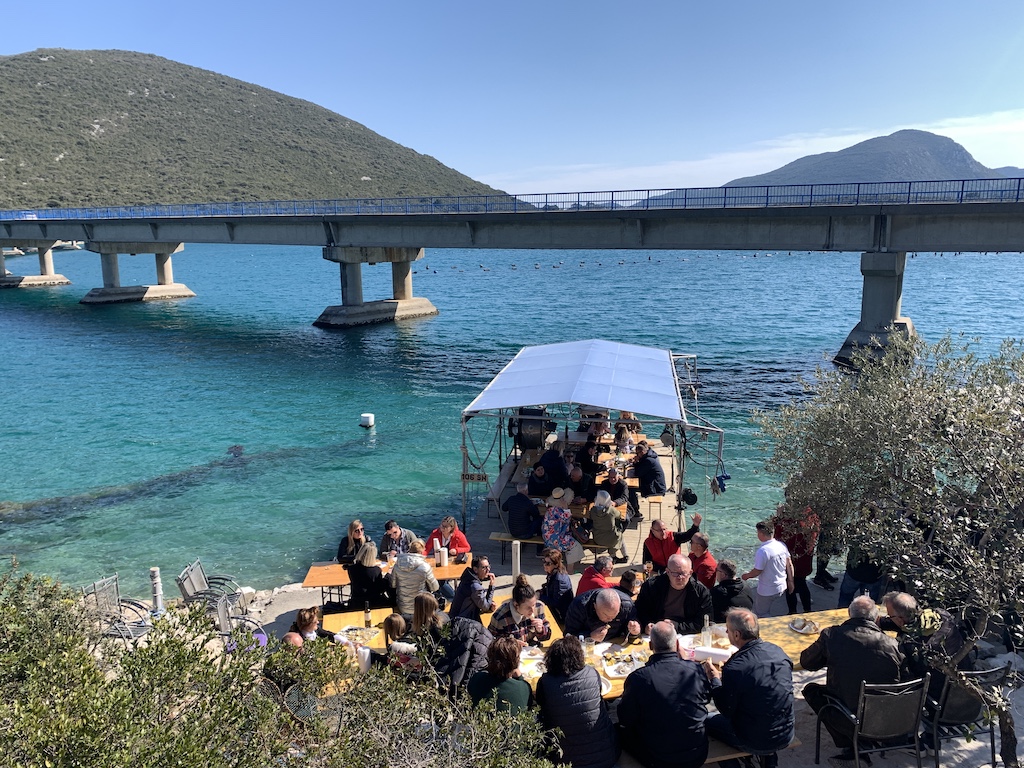 Dining on the Bistrina Bay with a beautiful view of the clear blue water.
Dining on the Bistrina Bay with a beautiful view of the clear blue water.
Story and photographs ©2022, Cyndie Burkhardt. https://photo-diaries.com
Learn more at TCN’s Digital Nomads channel.
Visit the Ston Oyster Festival from Split with the CROMADS Travel Club
March 14, 2022 - What if some of Croatia's best and most authentic experiences were made more accessible? Join the CROMADS Travel Club at this year's Ston Oyster Festival.
Croatia is a unique place in many ways. But one of the things I have come to appreciate over the years is just how many incredible (and incredibly local) things there are to do in this country, many of which are hardly known outside the local area.
We would like to change that, and to make the very best of those experiences more available to expats, digital nomads, and yes, locals too.
Having been an expat in many countries, I know how easy it is to get sucked into the expat way of life, surrounded by other expats and experiencing little of the county around. The CROMADS Travel Club aims to address that issue, if only a little.
Hand-picked events showcasing the best of Authentic Croatia, often experiences that even locals do not know too much about. Take a look at the first CROMADS Travel Club to Velika Gorica, for a truly GINcredible opening event.
Next up, the amazing world of Ston and Mali Ston, and its fabulous oysters. Join the CROMADS Travel Club on a fabulous day at the Ston Oyster Festival, departing from Split.
Immerse yourself in the world of oysters
What: Festival of Oysters
When: 19 March 2022
Where: Ston & Mali Ston, located on the Pelješac peninsula in southern Croatia.
Celebrating the return of the popular Oyster Festival after a two-year break.
Every year March is looked forward to by many as the time for the freshest and tastiest oysters to be enjoyed straight from the sea. Wine, salt and oysters, you can sample all three at the Festival of Oysters.
While traditionally held in Mali Ston, this year the festival will take place at three different locations, Brijesta, Luka and Bistrina. Three locations where oysters are actually grown. At each location visitors have the chance to taste oysters, muscles and other shellfish together with top quality wines from the Pelješac region at promotional prices.
Exclusive Experience
We will start our tour from Split and drive to the Ston area where we will stop off at one of the promoted oyster tasting locations. Here as a group we will indulge ourselves with an oyster tasting while enjoying local wine and live music.
There will also be free time for you to simply sit back and take in the atmosphere of the festival or enjoy a pleasurable lunch at one of the local restaurants making the most of local dishes at promo prices.
From here we travel a short distance to Ston, for all to enjoy a short stop to explore the village and learn about its local traditions and history. Then on to capture the quaintness of Mali Ston before beginning our drive back to Split. These two short stops will have you wanting more as you will learn why a longer visit to Ston is a must on your future itinerary.
Indulge
2022 looks like being a bumper year for oysters, an amazing time for you to immerse yourself in the world of oysters, the freshest and tastiest oysters in Europe. We can’t wait to have you join us!
For more information and to book, check out the CROMADS event page.
Worcon, Croatian Innovation & Personality in the Machine Tool Industry
February 2, 2021 - Croatian entrepreneurial excellence reaches all sectors of the economy. Meet Worcon, shaking things up in the machine tools industry - with a smile.
One of the most interesting and dynamic things happening in Croatia these days is the emergence of an inspiring generation of young entrepreneurial minds who are focusing on developing new tools and products for the global stage. With no time for politics, most have no memory of the Homeland War - indeed many were only born after it finished in 1995. They are firmly focused on their ideas and how to realise them in a fast-moving world of technological development, venture capitalists and AI.
As a journalist, I am coming into more regular contact with these bright minds of the future, and every meeting leaves me a little hopeful about the future, as well as uplifted, despite the gloomy times we find ourselves in. And never was that more true than meeting Worcon CEO Tin Keskic in his office in Varazdin Technology Park recently.
To be honest, I was a little apprehensive before the meeting. I may be a good writer, but how do you make Worcon's key products - a B2B marketplace and project management system for the machining industry - interesting to the average reader?
Simple, it seems. You just have to listen to Tin, whose smile and infectious laugh were constant companions throughout the meeting.
"The idea," he explained, " is just 1-5% of the game. You can have the greatest idea in the world, but if you cannot execute it, you have nothing. Let's call the idea X and the execution Y. If your idea is worth 10,000 and your execution is only 1, your business is worth 10,000. And if your idea is poor and only worth 1, but your execution is 10,000, you have the same. Now imagine you have an idea worth 10,000 multiplied by execution of 10,000. X times Y equals 100 million."
It was clear from the opening minutes of our chat that while Worcon's ideas are great, little progress would have been made without the executions - otherwise known as persistence, dedication and diligence.
Tin has worked with his hands all his life. First with his grandfather, who was a carpenter, then with his father working with steel. After studying electronics, robotics and engineering, he was thinking one day about the need for parts and where to find them. Yes, Google has the answer to many questions, but it is a hit and miss process, difficult to find the smaller and more obscure supplier. So he came up with the idea of creating a B2B platform of suppliers.
There was no money to fund the business in the early days, except for his own pay cheque from working with his parents, which he invested in paying his first employee. And he was always late with the payment. There was no budget for advertising, and so a mixture of cold calling and emails (thousands of emails) was the only way forward. He was 21 years old.
Initially, he allowed suppliers to list their services for free, but he soon learned that a free offer was regarded with suspicion, and that suppliers tended to respect sites where they had to pay. After building up a critical mass, he started to do just that, offering a very competitive listing price for suppliers, and a free listing of jobs required by buyers. Starting slowly in Croatia and the surrounding region, the number of suppliers started to grow steadily and become more global. There are now around 1,500 paying suppliers from all over the world.
The concept is simple. A buyer needs a tool or part constructed. They publish drawings, specs and deadlines on the Worcom B2B platform, and the suppliers bid for the job directly with the client (examples from current jobs above). Job quotations typically take less than 24 hours.
Business is extremely good. Two rounds of venture capital funding - an initial 50,000 euro followed by 400,000 euro - have given him the confidence to go forward with his ambitious place. A third round of funding in excess of 1 million euro is expected this year, which will help fund a rapid expansion, including sales offices in Milan and Munich and a total workforce of 20.
With all the cold calling and learning how the industry worked in his native Croatia, Tin was struck by the lack of systemisation many Croatian companies have in their business operations.
"So many companies were running their businesses in Excel, or even 'maybe Excel' (the boss would have everything in his head). One CNC shop with a turnover of 30-50 million and 70 employees is a case in point. They had no software and were doing many of the calculations in their heads. They are losing so much time and money, unable to accurately predict what is necessary to meet deadlines, or the best time of year to buy supplies - the price of steel varies a lot according to time of year, for example."
So Worcon came up with a project management system for CNC shop floors called MachineDesk, which is about to hit the market. MachineDesk helps the client every step of the way, from materials ordering and price tracking, to preparation time and hours needed. The project and deadline are entered into the system, after which calculations on how much time and materials are needed, pressure points on additional labour, automatic ordering of parts, and tracking of commodity prices. Workers will have tablets and can track the price of, for example, steel, which has widely different pricing in March and September. This is where companies are losing big money.
The software can tell the client with 99.9% accuracy how much he will need, including time calculations for things such as going to the warehouse, taking measurements etc - this time is not usually factored in. Everything is based on corrections, so if a 1,000-hour job needs 150 hours more, it will be even more precise next time.
One of the key benefits of Machine Desk is accountability, and the ability of client and supplier being able to track progress in real time. There is a lot of theft of materials in the workplace, for example, and Croatia is no different to other countries in that. The system tracks each item, and if something is reported broken, the physical presentation of the broken item will account for that.
With multi-warehouse options and full tracking, a German client using a Croatian supplier will be able to track progress of the order, including how many units were produced in a certain location on any one day. This should encourage efficiency and the meeting of deadlines, as well as giving the client a lot more security and peace of mind. An array of charts and spreadsheets are also available to show progress, useful for boardroom presentations.
And while Machine Desk is 99% the focus right now, there are already exciting plans afoot for expanding the Worcon portfolio.
"We are working with AI to read 3D models, if we succeed, we will revolutionise the industry. You will know your margins, we have AI, focused on prototypes and on companies who need something fast and now. We can sell this AI tech to bigger companies, getting smarter every day, and it will help them with their calculations."
The biggest success so far? Getting those two rounds of funding. When the first 50,000 euro came in in June 2019, there were very close to the edge, able to continue for perhaps 2-3 months more ("Imagine what it was like to suddenly then get 50,000 euro when you have been living off nothing."). He was just 24 when the second round of 400k came in last year.
And the biggest disappointments?
"Haha, after promising my parents that we had a unique concept which was going to conquer the world, I then found that there was some strong competition in the United States. That was a setback, but we overcome it. And also, perhaps, the numerous fake investors here in Croatia, promising lots and delivering nothing. Thankfully, we found two great investors, and things are now going really well."
Advice for new Croatian startups?
"Just start. And do not be afraid to ask for help. Or money. If you can't do that, you are not in the game. Remember that the idea is only 1-5%, and X times Y can equal 100 million. You have to be persistent.
"I am happy to help other startups, and I am glad that two have managed to get initial funding through my help. I also coach several startups on their pitch deck, which is a crucial aspect of fundraising."
Looking back at when you started, would you be happy to be in the position you are in now?
"Haha, I should show you the spreadsheets and revenue projections and where I thought we would be. The Porsche was parked in the drive, haha. But yes, I am very happy. We have great products, great investors and an unbelievable team. I am glad that I had to struggle to get this far, rather than being given a million by a rich father. It makes you hungrier."
"Where will I be in 5 years? Exited from Worcon is the plan, and working on some new startups. With the knowledge I have gained and the people I work with, it will be so much easier next time, and there are SO many great ideas."
And I, for one, would be VERY interested to learn more about those startups.
A fabulous Croatian startup with an even better attitude. One of the most pleasant interviews I have had in some time.
You can learn more about Worcon on the official website.
For the new MachineDesk platform, click here.
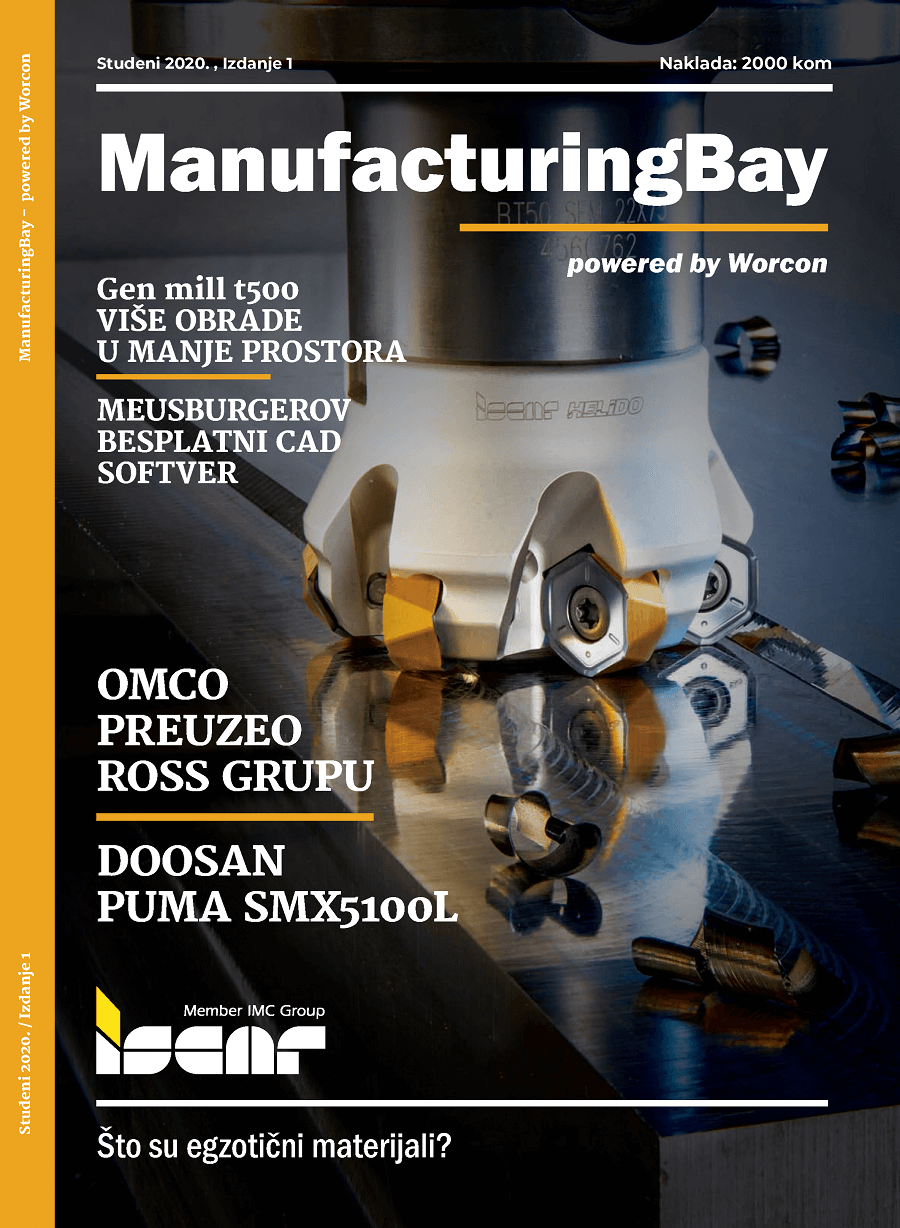
Worcon has also launched its own industry portal and printed magazine under the name Manufacturing Bay, see above.
For more stories of Croatian excellence and innovation, check out the TCN Made in Croatia section.
Valamar Invites All Digital Nomads to Istria and Krk Island
October 23, 2020 - Valamar invites all digital nomads to Istria and Krk Island as part of its 'long stay offer,' valid until March 2021.
Valamar is the latest to include a "long stay offer" or accommodation rental for at least one month, which is valid from September 30, 2020, to March 31, 2021.
HRTurizam reports that the special offer can be used in two Valamar camping resorts that are open all year round - Istra Premium Camping Resort 5 * in Poreč and Ježevac Premium Camping Resort 4 * on the island of Krk.
"The service of renting mobile homes for longer stays in Valamar's camping resorts is ideal for all guests who want to change the current location of their offices and allow themselves or their employees to work in nature with a fast internet connection," says Bruno Radoš, director of camp operations and regional director at Valamar.
In the package of services at the Istra Premium Camping Resort, guests will be able to use the free shuttle service and use the saunas, indoor pool, and gym at the nearby Valamar Diamant Hotel & Residence. The camp also has a Stay Fit program for exercise, fitness, and recreation through which they will be guided by coaches and other types of sports recreation and entertainment.
The offer also includes a modern camping home by the sea, high-speed internet connection (200/200 Mbit / s), premium family facilities, organized entertainment for children within the Maro Club, Multimedia Game Lounge, and Istra Theater.
"A longer stay in Valamar's camping resorts is ideal not only for guests who want to relax but also for companies that want to provide their employees with the opportunity to move their offices and stay in nature by the sea this fall and winter. When, in addition to all the services and benefits we provide to our guests, we add the excellent price of the accommodation package, which starts at 450 euro per month, we believe that guests will recognize a great opportunity for a long-term stay at sea," added Radoš.
Guests who decide to spend a longer period in Ježevac Premium Camping Resort on the island of Krk also expect opportunities for recreation on the multi-purpose sports field and rich facilities in the Multimedia Game Lounge - an entertainment zone with video games.
There is also a great complement to Valamar's online store Valfresco Direkt with free delivery of ready meals and groceries.
Thus, Valamar joined the new "long stay" trend of opening hotels according to the workspace model, following other global hotel chains, such as Hilton, Marriot, InterContinental, and many others. Also, Booking com and Airbnb have recently introduced options for longer stays in accommodation facilities.
"Digital nomads promote a new way of working and living, and we invite all those who simply want to change their place of residence for a while to come to Istria and the island of Krk and make a good and relaxing use of the coming months," concluded Radoš.
Interestingly, when we look at the bigger picture, Valamar is targeting families, digital nomads, and digital companies that can move their office to the modern campsites.
To read more about digital nomads in Croatia, follow TCN's dedicated page.
Croatia to be Among First Countries to Introduce Digital Nomad Visa: Here's What It Means
September 16, 2020 - Will Croatia be one of the first countries to introduce a digital nomad visa? A closer look into what this means for the country.
Vecernji List reports that digital nomads are people that work online, and all they really need is a high-speed internet connection. Thus, they can have a temporary office on the beach, in a cafe, on a train, in a park, or wherever the internet is fast and accessible enough. For this reason, digital nomads like to switch up the places and countries they work, because they are their own employer or are almost never obliged to meet their employers. They are mostly IT experts, writers, journalists, designers, or various creatives, and there are more and more jobs that can be done remotely due to technological advances and the development of online tools. Soon, digital nomads could become frequent Croatian guests, and Croatia could be one of the few countries in the world that will regulate the status of digital nomads and issue them a digital nomad visa.
The first step has been taken, the institute of digital nomads has been included in the proposal of the Foreigners Act, which had its first reading in Parliament on Friday, and should be debated and adopted by the end of the year and come into force at the beginning of 2021.
Credit is due to Dutch entrepreneur Jan De Jong, who is mostly responsible for bringing digital nomads to the attention of Croatian legislation. Namely, when asked what Croatia should do to improve its revenues, help Croatian companies survive, and make Croatia a year-round destination, not just a temporary visit for tourists in the three summer months, Jan answered that Croatia needs to regulate the rules on digital nomads, create a digital nomad visa, and open up the country to the world.
"Unfortunately, we have seen that many Croats leave Croatia solely for economic reasons. They didn't leave because they did not like the lifestyle in Croatia. Who wouldn't want to live in Croatia if you could live here on a German, Austrian, Swiss or Dutch salary? And that's where I see a big new industry emerging in Croatia - digital nomad tourism," wrote Jan De Jong and listed the advantages of Croatia, such as EU membership, great lifestyle, good internet, amazing climate, security, and affordable private health care.
Jan De Jong is interesting from several angles and has been on the Zagreb - Split route living his Croatian dream for almost 14 years. He arrived from the Netherlands to study and stayed. He started a business, successfully sold it, started a new one, and is just about to start another. But this time, we won’t tell you the story of Jan, his companies, his family, and business plans. This is the story of his mission to push Croatia in the direction that unites tourism and work, and of course, consequently generates additional revenues for the state and the economy.
Jan De Jong did not invent digital nomads, the nomad trend strengthened even before the corona crisis, but what he did was openly send a letter to Croatian Prime Minister Andrej Plenkovic on his Linkedin profile, urging him to address the issue of digital nomads and Croatia's position on that map. The Prime Minister reacted, invited him for an interview, listened to and acknowledged him, and enabled him to explain his initiative to the authorities in the Ministry of the Interior, the Ministry of Tourism, the Ministry of Labor, and the Ministry of Finance. In his open letter, Jan very simply explained why the digital nomad visa is needed.
"Imagine, give these digital nomads the right to come and work from Croatia to the maximum. Twelve months - regardless of citizenship according to the digital nomad visa. Many apartments that are empty out of season could find new tenants. The salaries that digital nomads earn will be spent in Croatia, resulting in a huge boost to our economy through consumption. If we open Croatia to tourists, why not open this country to highly paid digital nomads?" he wrote to the Prime Minister.
Namely, considering his own experience of living and working in Croatia, the development of technology, and the conditions of the corona crisis, Jan De Jong considers Croatia an ideal destination for work, for all those who can work remotely. The result of the first post, which highlights Croatia's advantages, achieved an impressive 300,000+ views, more than 4,000 likes, and a series of messages from people from all over the world, who are seriously considering temporarily moving to Croatia. The main question in the messages was how to run it and defining the conditions that need to be met. A wheel that would enable digital nomadism to be regulated in Croatia has been launched. As Jan De Jong said, he will have a meeting with the Minister of Finance and more concrete talks on models and solutions for digital nomadism in Croatia.
According to his estimate, by the end of the year, we could have a complete model on the table. However, property census, taxes, health care, insurance, accommodation, and residence needs to be resolved. When we talk about digital nomads, in a broader sense of the word, we are talking about those who need only an office and the Internet to work. In the corona crisis, digital nomads also became everyone who moved work in the office to their permanent place of residence, or, for example, to their parent's home or a holiday house. The story is simple when it comes to the migration of people within their own country, but it is a bit more complicated if we talk about residents of European Union countries and the wider European economic area who work remotely, change countries, and rent a house or apartment for an extended period in Croatia.
However, digital nomadism is greatly complicated when we talk about third-country nationals who would like to spend a long time, such as a year, in Croatia, and work for Google, Facebook, or another foreign company or are freelancers.
The first step, therefore, has been taken, and that is that the Government has passed a proposal for the Foreigners Act, which also includes the term digital nomads when it comes to a residence in Croatia for residents of third countries. The current law does not allow third-country nationals to move to Croatia temporarily, for a longer period of time. To begin with, they need a visa, and when it is granted, it is usually issued for a maximum of three months, and even then it is only a tourist visa, which means that legally, they should not even work in that period.
The new bill would allow digital nomads to work during those three months, and their temporary stay can last a maximum of 12 months, with the proviso that they can request it again only after six months of living abroad. For now, the property census has not been determined, and it is only certain that it will be higher than the one prescribed for, for example, family reunification or other reasons why third-country residents apply for long-term work or residence visas.
However, this part, as well as a number of other parameters that should be regulated such as taxes and insurance, should be adopted separately, by Government decree. As Jan De Jong said, a kind of working group, composed of representatives of the ministries, have started working, and so far, they have been informed about the various forms for countries like Estonia and their regulations. De Jong believes that we should look at Croatia's comparative advantages, that is, how Croatia can be more competitive. For example, who would be a good consumer in Croatia and with what salary, should be discussed.
Digital nomads could become a new revenue-generating trend, especially when it comes to younger age groups, those without families and school children, but perhaps also families who tend to move their lives from destination to destination. It was the corona crisis that pointed to these opportunities, and it seems that the Croatian Prime Minister, at least judging by the reaction on social media after meeting with Jan De Jong, saw an opportunity for Croatia, and said that Croatia would be among the first in the world to introduce a digital nomad visa. The idea of digital nomadism and remote work that would be an additional lure for tourists to come and spend in Croatia has already been embraced and is actively considered in some cities, such as Dubrovnik.
Mayor Mate Frankovic said that they are preparing a lot for this part of tourism. He will soon hold a conference in partnership with Saltwater Workspace and Total Croatia News on the topic of digital nomads, and they already have projects and spaces ready that would be suitable for nomads, from accommodation to coworking spaces. He especially praised his cooperation with one telecommunications company on high-speed internet, because high-speed internet, according to Frankovic, is a very important precondition for attracting these hybrid guest workers.
For the latest travel info, bookmark our main travel info article, which is updated daily.
Read the Croatian Travel Update in your language - now available in 24 languages
Join the Total Croatia Travel INFO Viber community.
Croatian Government Introducing New ID Cards, Regulating Digital Nomads
August 28, 2020 - On Thursday, the government accepted and sent to the parliamentary procedure amendments to the Law on Identity Cards and the Law on Foreigners, which should also regulate the temporary stay of digital nomads.
Novi List reports that according to the draft proposal for amendments to the Identity Card Act, which will be applied from August next year, in accordance with the European Parliament regulation on strengthening the security of Union citizens, the new identity cards will contain biometric identifiers in the form of faces and two fingerprints in interoperable digital formats.
Deputy Prime Minister and Minister of the Interior Davor Bozinovic reported that the age limit for issuing permanent identity cards has also been changed. It has been raised from the age of 65 to 70, while the identity card for citizens from the age of 70 will be issued with a validity period of five years.
Amendments to the law also prescribe the obligation to withdraw from the use of identity cards issued without a validity period that do not meet the minimum security standards. In addition, the new ID card will contain a two-letter Croatian mark printed on the front in a blue rectangle surrounded by 12 yellow stars.
"Apart from the amendments made to harmonize with the Regulation, the proposed amendments to the law would enable the use of electronic ID cards on mobile devices, and not only on personal computers as before. Citizens are given the opportunity to access electronic services and validly electronically sign documents using mobile phones or tablets. Citizens will not pay extra for the use of the appropriate software solution for mobile devices," specified Bozinovic.
The Minister added that these amendments stipulate the obligation for persons who have reached the age of 16 and who have been allowed by a court in a non-contentious procedure to marry in accordance with the provisions of the Family Law and have entered into marriage, to obtain an identity card if they reside in Croatia.
On Thursday, Bozinovic also presented a proposal for the Law on Foreigners, which stipulates that the Government no longer makes a decision on determining the annual quota of permits for employment of foreigners, but employers are already obliged to request the Croatian Employment Service to conduct a labor market test before applying for a residence and work permit for foreigners.
"If it is determined that there are no unemployed persons in the Republic of Croatia who meet the requirements of employers, employers should submit a request for a residence and work permit to the Ministry of Interior, which will ex officio ask the Croatian Employment Service for an opinion on the employment of a foreigner with a Croatian employer. The procedure for issuing residence and work permits, including the implementation of the labor market test, can take a maximum of 30 days," explained Bozinovic.
The Minister added that the bill prescribes exceptions to the implementation of the labor market test related to occupations such as carpenters, masons, waiters, butchers, and in the case of seasonal work up to 90 days in agriculture, forestry, catering, and tourism.
In order for the Government not to be obliged to re-issue the Decision on determining the annual quota of permits for the employment of foreigners, it is prescribed that the Law on Foreigners enters into force on 1 January 2021.
According to the proposal of the new law, a new institute of long-term visa is introduced, the so-called D visa, in case a third-country national is granted temporary residence due to work, family reunification, study, research, and secondary education.
Furthermore, the novelty is the prescribing and more favorable regulation of temporary and permanent residence for members of the Croatian people with foreign citizenship or statelessness, who have a certificate from the Central State Office for Croats outside the Republic of Croatia.
In addition, under more favorable conditions, family members of a Croatian citizen can acquire permanent residence, as well as foreign minor children who have been granted temporary residence for three years, and one of the parents has been granted permanent residence or long-term residence.
Bozinovic also announced a novelty which prescribes the possibility of regulating the temporary residence of digital nomads, i.e., foreigners who perform jobs digitally for foreign employers.
For the latest travel info, bookmark our main travel info article, which is updated daily.
Read the Croatian Travel Update in your language - now available in 24 languages
Istria Strives to be Top Destination for IT Professionals, Not Just Tourists
August 12, 2020 - Istria has long been known as a top tourist destination. However, companies from the ICT sector operating through the ICT Istria Expert Group and the Croatian Chamber of Commerce in Pula decided to further brand the quality of life of their region to attract top professionals and companies.
HRTurizam writes that that is why a Branding Strategy has been developed that promotes Istria as an ideal place to live, work and study. The goal is to create a stimulating business environment in which the competencies of the sector will create significant benefits not only for ICT companies but also for the economy of the entire county.
"The strategy will enable us better visibility and recognizability of our activities aimed at local self-government units, the academic community and the general public, all to popularize ICT in Istria. This sector can be a generator of strategic economic growth in the region, but it needs the support of the local community, not in business because they are top experts in their field, but in removing bureaucratic obstacles and the order of society itself," Dean Verbanac, President of the IT Group of Istria, points out, adding that through the development of the strategy, they have established the key advantages that Istria can offer as an ICT destination, but also identified the problems.
"Specifically, our shortcoming is the lack of professional staff. Joint action is needed to influence the creation of staff that will remain there. And not only that - we want to bring young ICT professionals to Istria," says Verbanac.
The corona crisis has shown the strength of the ICT sector, and now is the right time for the region to impose itself as an attractive destination for digital nomads. This requires the help of the state, i.e., the regulation of such a form of work that will enable experts to work for any world company and enjoy all the benefits of living in the local area.
The fact that innovative ICT companies such as Infobip, Inter Soft Technologies, Infosit are already operating successfully in Istria, achieving global success and representing a great development perspective certainly helps to attract experts. They are focused on new technologies, and often their clients are the world's leading companies in their segments. Thus, good foundations are already there.
The branding strategy defines five values of Istria - courage, excellence, local value, openness and ease of living. The problematic points are, in addition to the already mentioned lack of human resources, finding accommodation for professionals and bureaucracy.
Work is already being done on the visual identity of the ICT Istra Association, which will communicate the balance between business and private life, and on the other hand, show the diversity of advanced solutions that emerge in a. positive environment. This is precisely the comparative advantage that is important to emphasize nowadays in order to attract domestic and foreign IT talents.
A great new direction, added value and upgrade to tourism. Istria is an ideal destination for digital nomads.
For the latest travel info, bookmark our main travel info article, which is updated daily.
Read the Croatian Travel Update in your language - now available in 24 languages
Join the Total Croatia Travel INFO Viber community.
Split-Based Dutch Entrepreneur Jan de Jong: Croatia Should Introduce Visas for Digital Nomads
July 28, 2020 - Dutch entrepreneur Jan de Jong believes that Croatia should introduce visas for digital nomads as soon as possible, following the example of Estonia.
The coronavirus pandemic brought the world to a halt. Most work was done from home, and meetings and conferences were held via online video platforms.
Even now, many workers around the world are still working remotely, which Split-based Dutch entrepreneur Jan de Jong sees as a massive opportunity for the Croatian economy.
Namely, Dutchman Jan Je Jong moved to Croatia 13 years ago and now calls Split home. He believes that Croatia should introduce visas for digital nomads as soon as possible, following the example of Estonia, which implemented them about a month ago.
"Digital nomads are people who can work remotely, are not tied to one place, and they only need internet access. They choose this way of working while traveling the world. With the coronavirus pandemic forcing many companies to allow telecommuting, the trend has accelerated.
Forecasts say that by 2035, there will be about a billion digital nomads in the world. I believe that digital nomad tourism is a huge opportunity for Croatia because it can turn it into a year-round destination," explains Jan.
He adds that Estonia was a hit in international media with its move because it was the first country to introduce a visa for digital nomads, thus inviting highly skilled and highly paid teleworkers to their country, where they would ultimately live for a while and spend their salaries.
Their example was quickly followed by countries such as Barbados and Georgia. It would be an excellent promotion for Croatia if they showed leadership in presenting a visa for digital nomads. Time is crucial in this and I suggest that we do not invent a circuit but take the Estonian model and apply it to us. For example, their conditions for obtaining a visa are proof that you can work remotely, you can only work for foreign companies and clients, i.e., non-Estonians, and the minimum monthly income should be 3,500 euros before taxes," says Jan.
With a visa, digital nomads from all over the world could legally come to Croatia and work for a maximum of one year, but also travel and enjoy the benefits of the state.
"The main advantage for Croatia is year-round tourism and the arrival of highly paid workers who would not take jobs and spend their salaries in Croatia. There are currently 50,000 digital nomads in Bali, which has a similar population as Croatia. If these figures could be achieved in Croatia, assuming that each nomad would spend about ten thousand kuna a month for living, i.e., renting an apartment and a car, groceries, going to the hairdresser and dentist, etc., they could reach 500 million kuna, which goes directly into the budget monthly.
Digital nomads would be important for Croatia in terms of marketing, because they would share their experiences, videos and photos with their friends, but also on social networks, which would be a free promotion," Jan points out, adding that this would be a great way to start 2021.
He explains that a visa is not required for citizens of the European Union, but that is why it is, for example, for citizens of the USA. Jan adds that digital nomads from America can now legally stay in Croatia for three months on a tourist visa, and they are not officially allowed to work, although many freelancers do so. He points out that if we offer digital nomads the legal basis to stay in the country for a maximum of 12 months and work, perhaps more and more global companies will allow their employees to do just that for a certain period of time.
"Remember my words. Soon this will no longer be so innovative, as I expect many countries to follow the example of Estonia. It would be amazing to see Croatia as a leader in this; let's not wait for it to become a global standard. This time, Croatia has the opportunity to be among the first. We have opened the borders for tourists, why not open them for highly paid digital nomads as well?" adds Jan.
A few days ago, on LinkedIn, Jan published an open letter to the Prime Minister, Andrej Plenkovic, but he has not yet received a response.
"The support I received is simply amazing. I can say that people in Croatia and abroad liked the idea of visas for digital nomads. So far, I have not received an official response from the Prime Minister's Office, but my post on LinkedIn is full of messages from people around the world who want to know more about how they can come to Croatia to work and live for a limited period of time.
Everyone is interested in how this can be done, regarding taxes and residence permits. That is why a visa for digital nomads is important, in order to provide answers to all these questions," concluded Jan.
Source: Bankar.me
To read more about lifestyle in Croatia, follow TCN's dedicated page.


